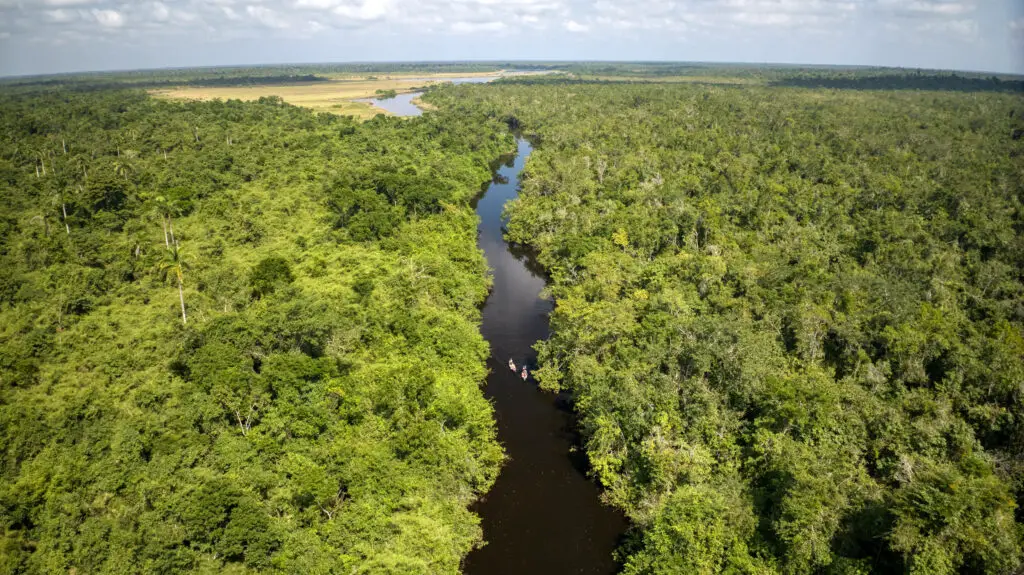If you’ve ever been to Florida, you know that air plants are everywhere. They’re in trees, on power lines, and even in the sand at the beach. You might be tempted to take one home with you, but before you do, you should know that it’s illegal to pick air plants in Florida.
Air plants are a type of Tillandsia, which is a genus of around 650 species of evergreen, flowering plants in the family Bromeliaceae. Tillandsias are native to tropical and subtropical regions of North and South America. In Florida, they’re found throughout the state, from the Panhandle to Key West.
While air plants are not endangered or threatened, picking them is still illegal. That’s because they’re protected under Florida’s Non-native Plant Rule . The rule prohibits the removal of certain non-native plant species from their natural habitats.
Air plants fall into this category because they’re not native to Florida (or anywhere else in the United States).
If you’re looking for a unique and easy-to-care-for houseplant, air plants are a great option. And if you live in Florida, you may be tempted to head out into the wild and collect your own. But before you do, it’s important to know that it is actually illegal to pick air plants in Florida.
Air plants are a protected species in the state, and it is against the law to remove them from their natural habitat. Doing so can result in hefty fines or even jail time. So unless you have a permit from the Florida Department of Agriculture and Consumer Services, leave those air plants alone!
Can You Collect Air Plants in Florida?
Yes, you can collect air plants in Florida! There are many different species of air plants that can be found in the state, and they are easy to care for. Air plants do not need soil to grow, so they can be collected from the wild without damaging their natural habitat.
Can You Take Air Plants from the Wild?
There are a lot of opinions out there about taking air plants from the wild. Some people think it’s perfectly fine, while others believe it’s best to leave them be. So, what’s the right answer?
As with most things in life, it depends. If you’re planning on taking just a few air plants from an area that’s not being harmed by their removal, then it’s probably okay. However, if you’re looking to take large numbers of air plants from an area that could be negatively impacted, it’s best to leave them alone.
Air plants are a great addition to any home and can thrive indoors with proper care. If you do decide to take some air plants from the wild, make sure to research how to care for them properly so they can continue to thrive in their new environment.
Where Can I Find Wild Air Plants in Florida?
Air plants are a type of plant that is found all over the world. In Florida, they can be found in many different habitats, including forests, wetlands, and even on beaches. While they are often seen growing on trees or other plants, air plants can also grow in the ground.
Are Air Plants Endangered?
No, air plants are not endangered. They are a common houseplant in the United States and can be found in many homes and gardens.

Air Plants Growing on Trees in Florida
Air plants are a type of plant that can grow without soil. They get their nutrients and moisture from the air and rain. Air plants are found in tropical and subtropical regions around the world, including Florida.
There are many species of air plants, but the most common one found in Florida is Tillandsia usneoides, also known as Spanish moss. Spanish moss grows on trees and other surfaces, such as power lines and fences. It is an epiphyte, which means it uses another plant or object for support but does not harm it.
Spanish moss does not have any roots; instead, it has thin stems that wrap around the tree or object it is growing on.
Spanish moss is often used in landscaping and floral arrangements because of its unique appearance. It is also used as packing material to protect fragile items during shipping.
Native Florida Air Plants
Air plants are one of the most unique and interesting plants that you can find. They are native to Florida and thrive in the warm, humid climate. Air plants get their name from their ability to grow without soil, as they absorb moisture and nutrients through their leaves.
There are over 80 different species of air plants, and they come in a variety of shapes, sizes, and colors. Some air plants have long, thin leaves while others have short, thick leaves. The flowers on air plants can be white, pink, purple, or red.
Air plants are easy to care for and make great houseplants or office Plants. They don’t need much water; just mist them with water a few times a week or soak them in water for about 20 minutes once a week. Bright indirect light is best for air plants; too much direct sun will scorch their leaves.
If you’re looking for a plant that is unique and low-maintenance, then an air plant is the perfect choice!
How to Remove Air Plants from Trees
- If you have air plants growing in your trees, you may be wondering how to remove them. While these plants are not harmful to trees, they can be unsightly and difficult to manage. Here are a few tips on how to remove air plants from trees: Use a ladder or step stool to reach the air plants.
- Gently grasp the plant near the base of the stem and pull it away from the tree trunk.
- If the plant is attached to roots, use a sharp knife or shears to cut them away from the tree. Repeat steps 2-3 until all air plants are removed from the tree.
Large Florida Air Plants
Air plants, or Tillandsia, are a unique type of plant that gets the majority of its nutrients from the air around it. Native to Florida, these plants are perfect for anyone looking for a low-maintenance option. Air plants don’t need soil to grow and can be mounted on anything from driftwood to rocks.
With proper care, air plants can thrive indoors or outdoors. When it comes to watering, air plants should be soaked in water for about 30 minutes once a week. If you live in a humid climate, you may only need to water them every other week.
Be sure to let the plants dry completely before putting them back in their home so they don’t rot. For best results, use filtered or rainwater as tap water can contain chemicals that can harm the plants. Air plants need bright but indirect sunlight.
If you live in a sunny climate, place your air plant in an area that gets morning sun and afternoon shade. If you live in a more temperate climate, an east-facing window is ideal. Be sure not to put your air plant in direct sunlight as this can scorch the leaves.
If you notice your air plant starting to bloom, congrats! This means your plant is healthy and happy. Once the blooms fade, you can snip them off at the base with scissors so the plant can focus its energy on growing new ones.
How to Take Care of Florida Air Plants
Florida air plants are a unique type of plant that grows without soil. They get all the nutrients they need from the air and water. Florida air plants are easy to care for and make a great addition to any home.
Here are some tips on how to take care of your Florida air plants:
- Give them plenty of light. Florida air plants need bright, indirect sunlight to grow. If you can, place them near a window where they will get plenty of light.
- Water them regularly. Florida air plants should be watered about once a week, or when the leaves start to look dry. Be sure to mist the leaves with water, as well as watering the root system.
- fertilize them monthly. You can buy special fertilizer for air plants, or use a regular houseplant fertilizer diluted in half. Fertilize your Florida air plants once a month during their growing season (spring and summer).
- Prune them as needed and trim off any dead or dying leaves as needed.
Where Do Air Plants Grow in Florida
In Florida, air plants grow in a variety of habitats. They can be found in wetlands, on beaches, in sandhills, and in many other locations. Air plants are also found in some artificial environments, such as greenhouses and nurseries.
Tillandsia Utriculata Florida
Tillandsia Utriculata Florida is a plant that is native to Florida. It is a member of the Bromeliaceae family and is also known as the giant air plant. This plant can grow to be up to 6 feet tall and has large, blue-green leaves. The flowers of this plant are pink or purple and bloom in the springtime.
Frequently Asked Questions
How do you take care of air plants in Florida?
Sure, here’s a short form of the care tips for air plants in Florida:
Light: Bright, indirect light near a window.
Humidity: High humidity in Florida is usually enough, but mist occasionally if needed.
Watering: Mist 2-3 times a week or soak for 20-30 minutes once a week. Let excess water drain.
Air circulation: Ensure good airflow to prevent mold.
Can air plants stay in water?
No, air plants (Tillandsia) should not be kept in water for extended periods. While air plants do absorb moisture and nutrients through their leaves, they do not have traditional roots that can handle being submerged in water. Leaving air plants in water for too long can lead to root rot and cause the plant to decline or die.
Can I touch my air plant?
Yes, you can touch your air plant, but it’s essential to handle them with care. Air plants (Tillandsia) have small, delicate leaves and are generally not harmed by light touching.
Conclusion
If you’re looking for a unique addition to your home décor, you may be tempted to pick up an air plant or two on your next trip to Florida. But before you do, it’s important to know that it is illegal to collect these plants from the wild without a permit. Air plants are a protected species in Florida, and taking them without permission can result in hefty fines.
If you’re caught picking air plants without a permit, you could be fined up to $500 per plant. So if you’re hoping to add some air plants to your collection, be sure to buy them from a reputable source.
Related Topics
Lightning Strikes Threat: Boreal Fires Jeopardize Carbon
 Dr Ahsanur Rahman, PHD
Dr Ahsanur Rahman, PHD
Bird Diversity in Agroforestry: Eco-Balance in the Tropics
 Dr Ahsanur Rahman, PHD
Dr Ahsanur Rahman, PHD







